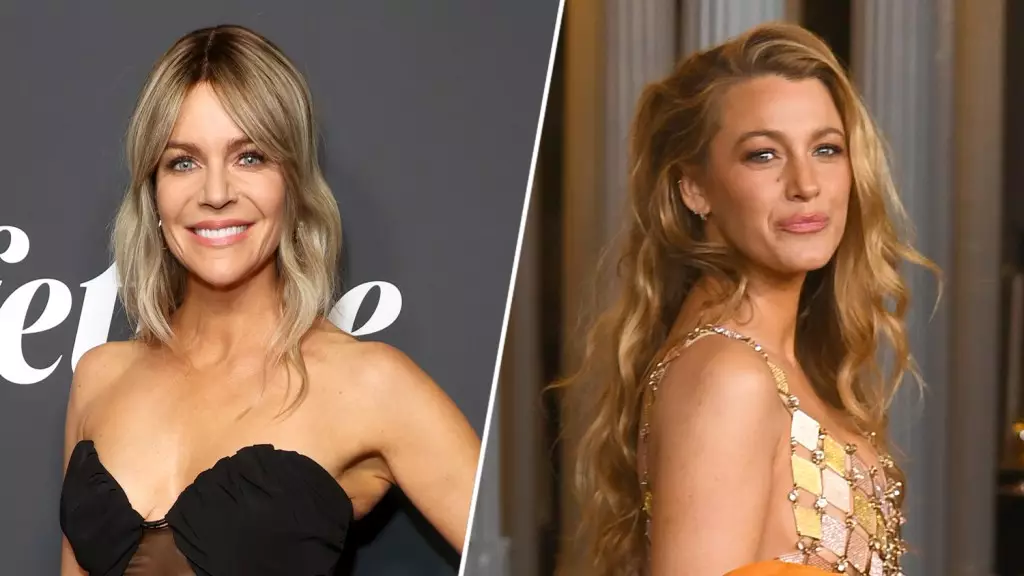In an unsettling turn of events within the Hollywood landscape, actress Blake Lively has publicly confronted serious allegations against Justin Baldoni, the director and co-star of the upcoming film “It Ends with Us.” Lively has accused Baldoni of sexual harassment and retaliation, painting a stark picture of a troubling environment on set that she claims nearly derailed production. As these revelations surface, support has poured in from various corners, including actress Kaitlin Olson, who took to Instagram to praise Lively’s character, highlighting her integrity and role as a caring mother.
The unfolding drama raises important questions about workplace safety and the power dynamics at play in the entertainment industry. Lively’s allegations underscore a critical need for accountability and transparency, particularly regarding treatment of women and those who dare to speak out against misconduct. While Olson’s support is noteworthy, the situation has generated a broader discourse about solidarity among women in Hollywood, especially in the wake of the #MeToo movement.
Lively’s bombshell accusations against Baldoni and his production company, Wayfarer Studios, are extensive, as detailed in an 80-page complaint filed with the California Civil Rights Department. The claims encapsulate a “hostile work environment” characterized by behaviors that Lively alleges were intended to silence her. She emphasized her intention to “pull back the curtain” on what she describes as calculated efforts to destroy her reputation following her decision to speak out.
In her statement, Lively expressed a commitment to exposing and combating the very tactics employed to intimidate individuals brave enough to report misconduct. This bold approach is essential not only for her case but also for the wider community, suggesting hope for change in an industry that has often been criticized for its culture of silence and complicity.
The response from Baldoni has been one of denial and disdain for Lively’s allegations, branding them “completely false” and “outrageous.” Through his lawyer, Baldoni has stated that the claims are rooted in a desire to tarnish his public image, invoking familiar rhetoric often seen in public relations battles. His accusations highlight a broader theme of deflection and blame that can be prominently observed in high-profile cases of alleged misconduct. The tug-of-war in the media between allegations and counterclaims is a reminder of the complexities inherent in such occurrences.
The situation becomes more convoluted with the involvement of Stephanie Jones, a former publicist for Baldoni, who herself has filed a lawsuit against him and his associates for defamation and breach of contract. The interwoven nature of these legal battles illustrates a chaotic and contentious backdrop, as various individuals aim to navigate the murky waters of reputational damage and legal repercussions.
The ramifications of this incident extend far beyond the immediate parties involved, serving as a bellwether for how allegations of misconduct are handled in Hollywood. The media’s role in shaping narratives around both Lively and Baldoni reflects an ongoing struggle over public perception. Notably, as noted by Baldoni’s legal counsel, the discussion invites comparisons to past media controversies involving figures like Megyn Kelly and Gabrielle Union, emphasizing the potential for narratives to be manipulated.
As this story develops, the public’s response will likely influence how similar allegations are managed in the future. Lively’s courageous stance has provided a voice for those who may feel powerless, sparking crucial dialogue about systemic issues within the industry. The complexity of these cases and the character attacks they incite serve as reminders that the path toward justice for victims often intersects with significant personal and professional fallout.
Ultimately, the unfolding drama surrounding Blake Lively and Justin Baldoni could signal a pivotal moment for Hollywood. As awareness of workplace misconduct intensifies, and as public figures like Lively and Olson speak out, there lies the potential for genuine reform. While onlookers await the outcome of this controversial situation, the calls for accountability ring louder than ever, suggesting that the entertainment community may finally be at the precipice of meaningful change.

